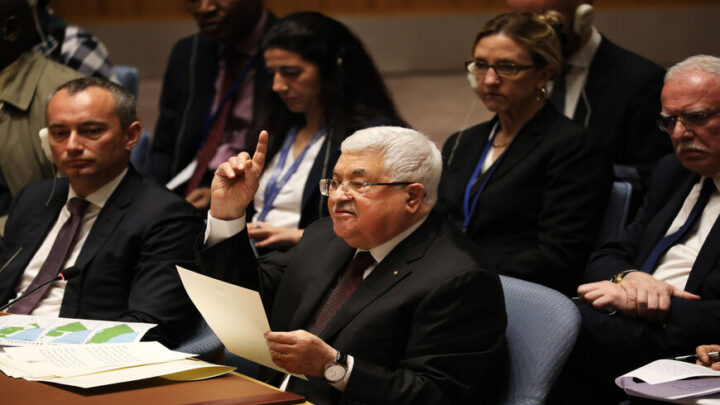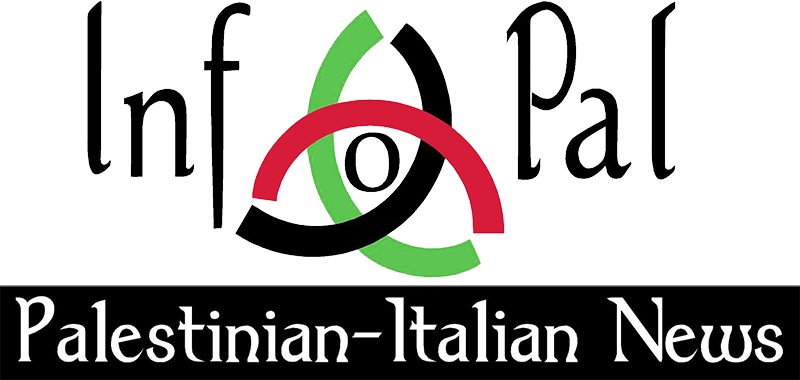
Al-monitor.com. (Da Frammentivocalimo.blogspot.com). Per anni, la coalizione AMAN costituita da organizzazioni non governative palestinesi (ONG) si è concentrata su questioni di corruzione amministrativa e finanziaria. Tuttavia, la sezione palestinese di Transparency International, fondata nel 2000, ha deciso nel 2021 di affrontare una questione molto più controversa: la corruzione politica ,evidenziata dal rinvio delle elezioni nazionali.
Nella loro rabbia per il deterioramento del sistema politico palestinese, molti hanno ripetuto una dichiarazione fatta dal presidente palestinese Mahmoud Abbas : si sarebbe dimesso se 50 o più palestinesi lo avessero invitato a dimettersi. Abbas, 86 anni, è ora al suo 12° anno in carica dopo aver passato da tempo il suo mandato di quattro anni e aver consolidato tutti i poteri nelle sue mani.
In un manifesto in 10 punti, AMAN ha invitato i palestinesi a rifiutare questo pendio scivoloso antidemocratico e ha rivolto un appello alle organizzazioni della società civile per “combattere questa corruzione politica creando una coalizione che possa contribuire a fondare un governo più onesto“.
Shuibi, un ex membro del Consiglio legislativo palestinese, ha prodotto il primo studio anticorruzione nel 1996, provocando la reazione rabbiosa del presidente Yasser Arafat e l’arresto di un giornalista palestinese che ha riportato la denuncia . Shuibi, ora consigliere sulla questione della corruzione, ha dichiarato ad Al-Monitor che la situazione è molto grave e deve essere affrontata con gli sforzi di tutti i soggetti coinvolti.
“Dobbiamo alzare la bandiera rossa e lanciare un forte avvertimento : se l’attuale corruzione politica non viene controllata, ci stiamo dirigendo in una zona pericoloso. ” infatti la leadership ha rafforzato il suo controllo su tutti i settori della società per bloccare le accuse di corruzione, per scalfire la magistratura , per soffocare gli sforzi della società civile.
AMAN ha affermato che 50 ambasciatori palestinesi sono al loro posto da più di cinque anni e 14 da più di 10 anni. Sei governatori sono in carica da sette anni e quattro capi delle agenzie di sicurezza non sono cambiati da più di 10 anni.
Shuibi ha sottolineato che tutti devono essere coinvolti per salvare la situazione. “Vogliamo che tutti siano coinvolti, siano essi al potere, fazioni, partiti politici o società civile. Stiamo andando verso il basso e stiamo vedendo l’evolversi di quel potere autoritario che frantumerà i sogni palestinesi , espressi nella Dichiarazione di Indipendenza Palestinese . La corruzione in Palestina si è aggravata dall’ ‘istituzione dell’Autorità nazionale palestinese circa 28 anni fa. L’Anp per l’assenza di un parlamento e di un esecutivo ha monopolizzato tutti i settori del governo. Ecco perché il sistema politico è corrotto”
Gli appelli alla riforma sembrano aver avuto un certo successo. Abbas ha accettato di incontrare una delegazione di leader della società civile che gli hnno a consegnato una lunga lista di questioni che devono essere affrontate. Non c’è stata alcuna dichiarazione pubblica da entrambe le parti . L’agenzia di stampa palestinese Wafa ha riportato che Abbas, durante l’incontro del 9 settembre , ha detto ai leader della società civile: “Siamo partner nella difesa dei diritti del popolo palestinese di fronte all’occupazione e ai suoi piani volti a liquidare la causa palestinese”.Abbas ha anche sottolineato l’importanza della libertà di opinione nel quadro delle leggi pertinenti.
Shuibi ha accolto con cautela l’incontro dei capi della società civile con il presidente, ma non è stato del tutto rassicurato. “Nel migliore dei casi possiamo aver rallentato il movimento verso il basso”. In ogni caso i leader della società civile vogliono vedere i fatti e non le parole. Naturalmente, la corruzione politica non si limita alla Cisgiordania e al governo Abbas, ma si applica anche alla Striscia di Gaza, dove la situazione è peggiore Questo deterioramento, durato così a lungo, è in parte causato dal fatto che l’occupazione è durata troppo a lungo.
Traduzione sintesi di Frammenti Vocali da Palestinian NGOs begin campaign against political corruption
September 15, 2021.
For years, the AMAN coalition of Palestinian nongovernmental organizations (NGOs) focused on issues of administrative and financial corruption. However, the Palestine chapter of Transparency International, which was established in 2000, decided in 2021 to tackle a much more controversial issue: political corruption.
Those two words seem to many to be synonymous rather than an oxymoron, but the eroding integrity of the current Palestinian leadership appears to have forced the local Transparency International to raise the stakes and tackle a corrupt political system that among other things canceled an already long-overdue national election and allegedly ordered harming a critic in Hebron by the Palestinian security forces, an act that led to his death and the violent crackdown of demonstrations calling for accountability.
In their anger at the deterioration of the Palestinian political system, many repeated a statement made by Palestinian President Mahmoud Abbas that he would resign if 50 or more Palestinians call on him to step down. Abbas, 86, is now in his 12th year in office after long passing his four-year term and appears to have consolidated all powers in his hands.
In a 10-point manifesto, AMAN called on Palestinians to reject this anti-democratic slippery slope and made a special plea to civil society organizations to “fight this political corruption by creating a coalition that can contribute to making a change toward a more honest governance structure.”
Azmi Shuibi, a former member of the Palestinian Legislative Council, produced the first-ever anti-corruption study in 1996, which resulted in an angry reaction from President Yasser Arafat and the arrest of a Palestinian journalist that broadcast the report. Shuibi, now an adviser on the issue of corruption, told Al-Monitor that the situation is very serious and must be addressed with the efforts of all involved. “We need to raise the red flag and make a loud warning that if the current political corruption is not checked we are moving into a dangerous zone,” he said.
What appears to have triggered the escalation of criticism by civil society was the combination of restrictions on the two main sectors of governance. Shuibi noted, “It became clear that we have reached a situation where the leadership has tightened its control over all the sectors of society, including all the outlets that were used in the past; to follow up on allegations of corruption make the anti-corruption efforts of civil society useless. They not only succeeded in stopping any criticism from the legislative branch, but the executive branch has been chipping away at the judiciary. Without a legislature and a cornered judiciary, the ruling party was able to stifle the efforts of people calling for accountability. Things got even worse when the president started using presidential decrees without any discussion or debate for his own purposes and to keep certain people in position for a long time.”
In order to illustrate the problem, AMAN produced a set of infographics. It stated that 50 Palestinian ambassadors have been in their posts for more than five years and 14 more than 10 years. Six governors have been in their posts for seven years and four heads of security agencies have not been changed in more than 10 years.
Speaking on Wattan TV, Shuibi said everyone must get involved to save the situation. “We want everyone to be involved — whether it is those in power, factions, political parties or civil society. We are heading downward and we are seeing some signs of what kind of authoritarian power we will have that will shatter the Palestinian dreams as expressed in the Palestinian Declaration of Independence.”
Shuibi explained that the problem is no longer petty corruption or even financial based on the lack of accountability, but that it has become a much more existential problem.
Shihab Amjad, an international relations professor at Al-Quds University, told Al-Monitor that corruption has been festering in Palestine since the establishment of the Palestinian National Authority some 28 years ago. “The PA has become a rentier system without any mechanism for accountability and the absence of a parliament and an executive that has monopolized all sectors of government. This is why the political system has been corrupted,” he said.
The calls for reform appear to have had some success. Abbas agreed to meet with a delegation of civil society leaders who handed him a long list of issues that need to be addressed. There was no public statement by either side as to what is on the list and what the reaction of the Palestinian president is. The Palestinian news agency Wafa said that Abbas during the Sept. 9 meeting told civil society leaders, “We are partners in defending the rights of the Palestinian people in the face of the occupation and its plans aimed at liquidating the Palestinian cause.”
Abbas also stressed the importance of freedom of opinion within the framework of relevant laws, in regard to the promotion of public freedoms.
Shuibi cautiously welcomed the meeting of civil society heads with the president, but he was not totally reassured. “At best we might have slowed down the downward movement,” he noted.
It is unclear if the campaign to elevate the criticism to political corruption was behind the surprise meeting, but civil society leaders want to see action and not words. Of course, political corruption is not limited to the West Bank and the Abbas government, but applies to the situation in the Gaza Strip where there is an even worse case of political corruption. A holistic approach in which all relevant groups are needed to put a stop to this deterioration that has gone on too long is in part caused because the occupation has gone on too long.
